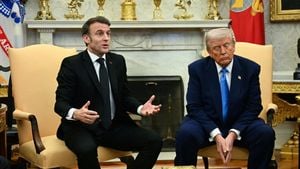President Donald Trump has reaffirmed his intent to impose 25% tariffs on imports from Mexico and Canada, stating emphatically, "The tariffs are going according to schedule and moving quickly." This announcement came during a joint press conference with French President Emmanuel Macron on February 24, where Trump outlined his reasons for the tariffs, which primarily include pressures on Mexico and Canada to combat illegal immigration and the trafficking of fentanyl.
Initially suspended on February 3, the imposition of these tariffs is now set to commence on March 4, 2025. During the one-month pause, both Mexico and Canada have engaged with the U.S. government, seeking avenues to avert the proposed tariffs, but Trump confirmed, "The tariffs are following on schedule, and they are advancing rapidly," demonstrating his administration's commitment to this directive.
The timing of the tariffs has sparked significant discussions and immediate reactions from both affected nations. Mexico, led by President Claudia Sheinbaum, has taken proactive measures, deploying 10,000 members of the National Guard to bolster security along its northern borders. Sheinbaum has been vocal about the urgency of reaching important agreements, stating, "This Friday, we need to be arriving at significant agreements," highlighting the tight deadline imposed by Trump's threat.
Experts fear the consequences of these tariffs could ripple through the economy, influencing everything from manufacturing to consumer prices, especially within the automotive industry. The U.S. has been reliant on imports for numerous components, and as some economists warn, the burden of these tariffs will likely shift to consumers and businesses, who will face increased costs for goods. The Consumer Confidence Index has already reflected concern over these future economic impacts, declining by 10% amid fears of impending slowdown.
Trump's tariffs are not just limited to Canada and Mexico; the president has implicated broader retaliatory measures against countries he deems as taking unfair advantage of the U.S. market. He stated, "If someone charges us, we charge them back—this will be good for our country," indicating his administration's shift toward more aggressive trade policies and practices. Contradicting assertions from economists who argue the tariffs could undermine trade relations and economic stability, Trump remains steadfast, blaming previous administrations for allowing unfavorable trade deals.
Historically, the U.S. has engaged with its neighboring countries to maintain trade diplomacy, particularly under frameworks like the United States-Mexico-Canada Agreement (USMCA). The renewed threats of tariffs have put these long-established agreements at risk. Canada has responded to Trump's tariffs with its own strategic measures, having recently appointed a narcotics czar to address issues surrounding drug trafficking—a direct response to one aspect of Trump's tariffs. Both the U.S. and Mexico are walking the tightrope of negotiations, each working to alleviate the mounting tensions surrounding trade and domestic issues.
With these developments, the stakes are high for all involved parties. The forthcoming weeks will likely see intensified dialogue and diplomacy as Mexican and Canadian officials attempt to reach solid agreements with their U.S. counterpart. Mexico's economy has been heavily reliant on exports to the United States, and any tariffs could create significant disruptions, particularly for sectors such as automotive manufacturing, which relies on just-in-time inventory from its neighbor.
Trump has characterized the tensions as long overdue corrections of past trade imbalances, stating, "We've been mistreated by many countries, not just Canada and Mexico; they have taken advantage of us, and we must make sure this does not continue to happen." His remarks spark questions about the long-term effects of lifting or maintaining tariffs, especially as the economic and political ramifications extend far beyond immediate trade numbers.
Negotiations to avert tariffs remain at the forefront of discussions as the March deadline looms. Both nations are clearly attempting to demonstrate good faith efforts in combating issues acknowledged by the Trump administration. With heightened military presence at shared borders and strategic governmental discussions, it remains to be seen whether these attempts will be sufficient to prevent tariffs from being implemented.
For now, the pressing matter of tariffs looms large over the relationship dynamics between the U.S., Mexico, and Canada. Discussions will not only determine the immediate economic impact but also set the tone for future bilateral relations and trade practices within North America. The resolution—or lack thereof—indicates the precarious nature of trade diplomacy and how domestic policies interweave with international agreements and economies.



